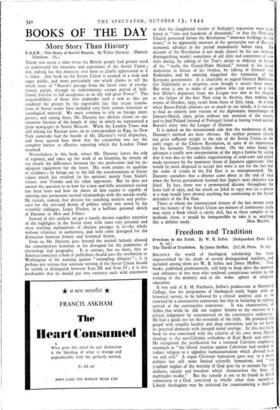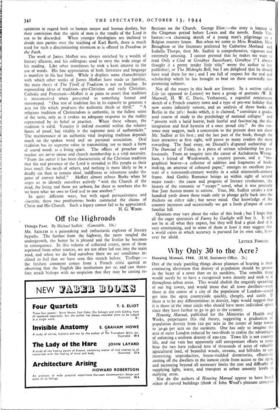Freedom and Tradition
The Thrill of Tradition. By James Moffatt. (S.C.M. Press. 7s. 6d.) RECENTLY the world of theological scholarship has been impoverished by the death of several distinguished teachers, and included among them are W. B. Selbie and James Moffatt. Two books, published posthumously, will help to keep alive the memory and influence of two men who rendered conspicuous service in the training of the ministry and in the wider sphere of religious education.
It was said of A. M. Fairbairn, Selbie's predecessor at Mansfield College, that his programme of theological study began with an historical survey, to be followed by a critical analysis and to be crowned by a constructive endeavour, but that in lecturing he seldom
arrived at the constructive endeavour. It was characteristic of Selbie that while he did not neglect history or the exercise of a critical judgement he concentrated on the constructive endeavour. He had a quick eye for the essentials of the faith. He preached the gospel with singular lucidity and deep conviction, and he set forth its practical demands with intrepid moral courage. In this last little book he was concerned with the relation of his own more liberal theology to the neo-Calvinist orthodoxy of Karl Barth and others. He recognised the justification for a renewed Calvinist emphasis, inasmuch as " the liberal reaction against Calvinism had tended to reduce religion to a spineless humanitarianism which glossed over sin and evil." A vague Christiad humanism gave way to a more definite but still more limited scientific humanism, and " the resultant neglect of the worship of God goes far to account for the dullness, vacuity and boredom which characterises the lives of multitudes to-day." But the remedy is not to be found in blind submission to a God conceived as wholly other than ourselves. Liberal theologians may be criticised for countenancing a shallow optimism in regard both to human nature and human destiny, but their conviction that the spirit of man is the candle of the Lord is not to be discarded. When younger theologians are inclined to divide into parties over the teaching of Karl Barth, there is much need for such a discriminating eirenicon as is offered in Freedom in the Faith.
The work of James Moffatt was always enriched by a wealth of literary allusion, and his colleagues used to envy the wide range of his reading. Like other translators he took a keen interest in the use of words. His fine appreciation of both literature and language is manifest in his last book. While it displays some characteristics with which other works of James Moffatt have made us familiar, the main thesis of The Thrill of Tradition is not so familiar. In expounding ideas of tradition—pre-Christian and early Christian, Catholic and Protestant—Moffatt is at pains to assert that tradition is misconceived when presented as something formal and stereotyped. " One test of tradition lies in its capacity to generate a zest for life which produces the authentic throb or thrill." ," A religious tradition of Christendom is authentic, in the fullest sense of the term, only as it evokes an adequate response to the reality
represented by its belief or practice. When these vibrate, the tradition is valid. Veracity is indeed essential within the relative limits of proof, but vitality is the supreme note of authenticity." The maintenance of an authentic vital inspiring tradition depends much on the spoken word and on personal association. Oral tradition has its supreme value in transmitting not so much a form of sound words as a living spirit. The offices of preacher and teacher are never otiose and church membership is a vital necessity. " From the outset it has been characteristic of the Christian tradition that the real presence of the Lord is revealed to His people as their lives touch the needs of others, and nothing is more likely to be a deadly sin than to remain aloof, indifferent or inhumane under the guise of correct belief." Moffatt almost echoes Burke when he urges us to identify ourselves actively " with the Church of the dead, the living and those yet unborn, for there as nowhere else do we learn what we owe to God and to one another."
In quite different ways, but with equal persuasiveness and sincerity, these two posthumous books commend the claims of Christ and His Church. Such a legacy cannot fail to be appreciated. H. G. WOOD.



























 Previous page
Previous page